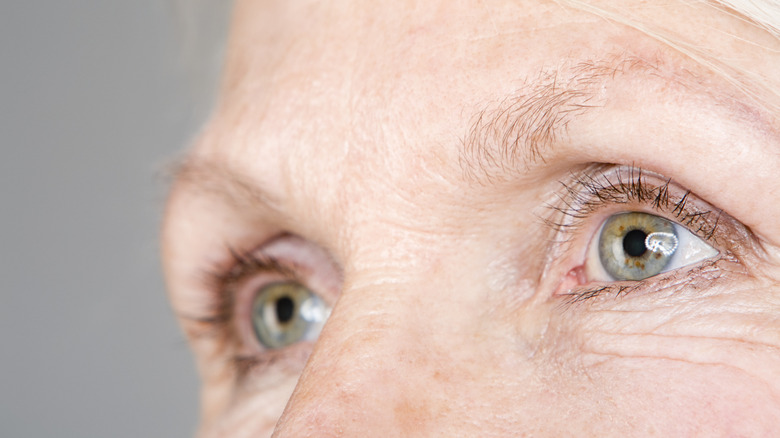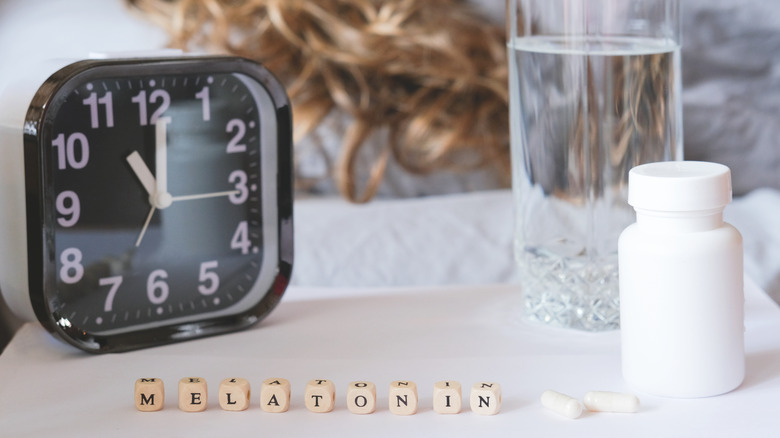Melatonin Does More Than Make You Tired - Here's What Else The Sleep Aid Can Do For You
After a day of looking at a screen — be it for work or simply keeping up with texts, headlines, and social media posts — can leave you feeling tired but unable to sleep. Or maybe you have a late shift that causes you to go to bed at odd hours. Or perhaps you have insomnia and are used to nights of tossing and turning. A lack of melatonin may be the culprit. Adding melatonin to your nightly routine can help you get much-needed rest at night — or whenever you go to bed.
While it's best known as a sleep aid, recent studies show that melatonin can benefit you in other areas of health that stretch beyond a good night's sleep. Experiencing indigestion, chronic pain, IBS, or migraines? Studies are showing that melatonin has the potential to help with those conditions while also helping you get restful sleep at night.
Melatonin for sleep
Melatonin is a hormone your body produces that signals sleep. Melatonin production increases as light decreases and is linked to your circadian rhythm, a process that regulates sleep. Exposure to excessive light, including the blue light emanating from phones and laptops, can cause the level of melatonin your body produces to decrease. Age also contributes to the amount of melatonin your body produces: the older you get, the less melatonin your body makes. Over-the-counter melatonin could be a solution.
"Your body produces melatonin naturally. It doesn't make you sleep, but as melatonin levels rise in the evening, it puts you into a state of quiet wakefulness that helps promote sleep," Luis F. Buenaver, Ph.D., sleep expert and assistant professor of psychiatry and behavioral sciences, said to John Hopkins Medicine.
In addition to taking the supplement, preparing an environment for sleep is also important. Buenaver went on to say that putting away electronic devices, turning off the TV, and dimming lights before bed can help with falling asleep.
Melatonin for gut health
Melatonin isn't only for sleep. For those struggling with digestive issues ranging from GERD to IBS, melatonin could be a promising addition to your supplements. A 2021 review of synthetic melatonin from StatPearls showed that it had antioxidative and anti-inflammatory effects that could help ease pain related to gut health. A 2022 study in the Frontiers in Neuroscience journal indicated that, since sleep is important to gastrointestinal (GI) functioning, melatonin helps synchronize your body's circadian rhythm with your environment, ultimately aiding sleep, which contributes to proper GI regulation.
Like with using melatonin for sleep, using it for gut health also relies on finding the smallest dose that works for you. University Health News shared that melatonin helps to keep things moving smoothly in the gut. The 2022 study further explains that small doses of melatonin get things moving, while higher doses slow things down. Research is still limited regarding the relationship between gut health and melatonin, but it is growing.
Melatonin and Migraines
Those suffering from migraines might also find some relief with melatonin. Migraines are severe headaches that typically occur on one side of the head that lasts for several hours or a couple of days. Other symptoms, such as nausea and sensitivity to light and sound, often accompany the headaches. A 2010 study in Headache: The Journal of Head and Face Pain found that some people with migraines have lower levels of melatonin, making the supplement a potential aid.
A 2019 review of melatonin for migraine treatment in the journal Medicine shared that melatonin can help with migraines in numerous ways, one of which is by helping regulate neurotransmitters and neural pathways. While the study called melatonin promising, it also acknowledged there needed to be further research on its effectiveness and role in helping alleviate migraines.
"Melatonin cannot replace the other preventive measures. Results of some studies have shown effectiveness, while others did not," Medhat Mikhael, MD, Medical Director of Orange Coast Medical Center's Spine Health Center, said to PsychCentral. Essentially, melatonin alone is not very effective in helping with migraines, but it could be helpful for some if taken along with their usual migraine medications.
Melatonin and eye health
Eye health is another area where melatonin can be beneficial. A review in the Progress in Retinal and Eye Research journal found that it has the potential to lower intraocular hypertension (IOP), which is essentially pressure in the eyes. This same study explained that high IOP is associated with glaucoma, meaning that melatonin has the potential to serve as a preventative measure against glaucoma. However, like with melatonin in relation to digestive health and migraines, research is ongoing.
Melatonin is also a potential aid in countering age-related macular degeneration. Macular degeneration (AMD) is an eye disease that impacts the retina and results in poor vision—especially when it comes to seeing fine details. A 2013 study featured in Advances of Gerontology concluded that melatonin was a promising way of preventing and treating AMD largely because of the way it preserved neurosensory cells and associative and ganglionic neurons in the retina. Your body decreases melatonin production as you get older, so adding the supplement is extra support for your vision against eye disease.
Side effects and usage
Melatonin is generally safe. A 2018 study featured in Complementary Therapies in Medicine suggests that taking melatonin long-term has minimal side effects, but most physicians recommend taking melatonin every night for short-term use. Its common side effects include dizziness, headaches, daytime sleepiness, and nausea.
Regarding figuring out what works for you, consult with your doctor first. Individuals who are pregnant, breastfeeding, depressed, or have an autoimmune disease or seizure disorder should refrain from taking it. There are no official specifications to follow regarding melatonin dosages as it's classified as a dietary supplement by the U.S. Food and Drug Administration (FDA). However, like with most medications and supplements, age, body weight, and gender can affect the amount needed for an effective dose. Experts suggest starting small and increasing as need be.
Melatonin has great potential in a variety of health areas. Talk with your doctor to see how it can best benefit you, whether by mitigating pain or catching some extra Zs.





